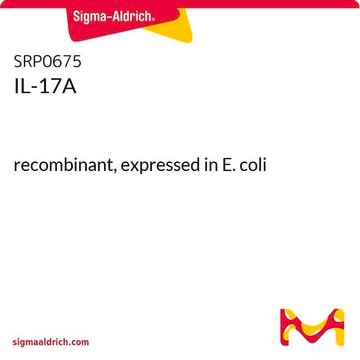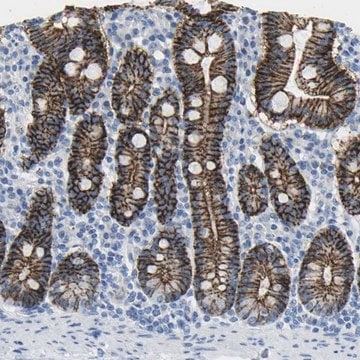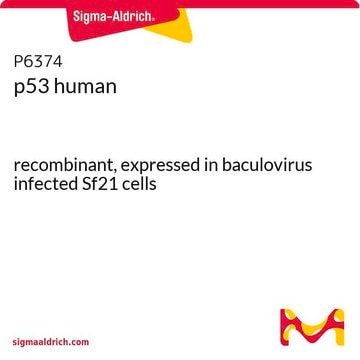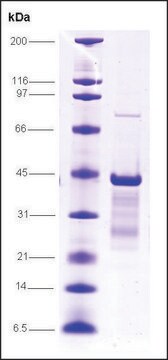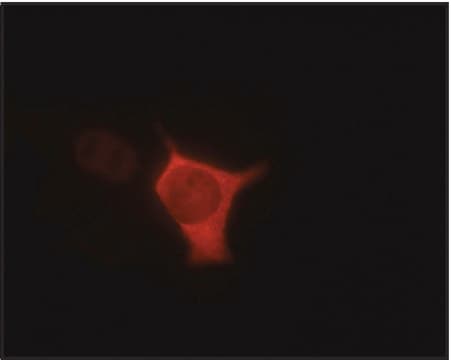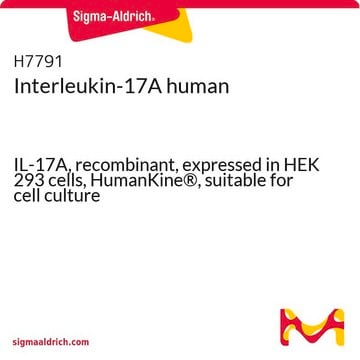推薦產品
生物源
human
重組細胞
expressed in E. coli
化驗
≥80% (SDS-PAGE)
形狀
frozen liquid
分子量
~34.6 kDa
包裝
pkg of 10 μg
濃度
400 μg/mL
技術
western blot: suitable
顏色
clear colorless
NCBI登錄號
UniProt登錄號
運輸包裝
dry ice
儲存溫度
−70°C
基因資訊
human ... TP53(7157)
一般說明
p53 is a tumor suppressor gene expressed in a wide variety of tissues. It is a tetrameric nuclear DNA-binding phosphoprotein. The gene encoding it is localized on human chromosome 17p13.1.
生化/生理作用
Tumor suppressor p53 has the capability to induce cell cycle arrest and has a role in DNA repair, senescence and apoptosis. It binds to Simian vacuolating virus 40 (SV40) T-antigen and human papilloma virus E6 protein. The p53 gene is mutated in various cancers, such as of the breast, ovarian, bladder, colon and lung.
p53 was identified as a tumor suppressor by showing that this protein has the ability to block transformation and to inhibit tumor cell growth. In addition, p53 is a transcription factor capable of regulating the expression of a subset of downstream genes. Mutation of two specific N-terminal residues in p53 (residues Leu22 and Trp23) impairs the ability of p53 to transactivate and has been correlated with its ability to bind TAFII40 and TAFII60 (or TAFII31 and TAFII70) suggesting that one or both of these interactions is important for activation. Mutation of residues 22 and 23 to Ala does not affect binding to TBP, although mutation of these residues to charged amino acids has been reported to disrupt the p53-TBP interaction. Different mutations in p53 gene have been characterized in a variety of human cancers. Loss or mutation of p53 function is highly correlated with tumorigenesis.
外觀
Clear and colorless frozen liquid solution
準備報告
Use a manual defrost freezer and avoid repeated freeze-thaw cycles. While working, please keep sample on ice.
儲存類別代碼
10 - Combustible liquids
水污染物質分類(WGK)
WGK 1
閃點(°F)
Not applicable
閃點(°C)
Not applicable
The Cell: A Molecular Approach (2000)
Chromosomal instability and tumors promoted by DNA hypomethylation.
Eden A, et al.
Science, 300(5618), 455-455 (2003)
The Cell: A Molecular Approach (2000)
D Michalovitz et al.
Cell, 62(4), 671-680 (1990-08-24)
Mutant p53 can contribute to transformation, while wild-type (wt) p53 is not oncogenic and actually inhibits transformation. Furthermore, wt p53 may act as a suppressor gene in human carcinogenesis. We now describe the temperature-sensitive behavior of a particular mutant, p53val135.
S J Baker et al.
Science (New York, N.Y.), 249(4971), 912-915 (1990-08-24)
Mutations of the p53 gene occur commonly in colorectal carcinomas and the wild-type p53 allele is often concomitantly deleted. These findings suggest that the wild-type gene may act as a suppressor of colorectal carcinoma cell growth. To test this hypothesis
我們的科學家團隊在所有研究領域都有豐富的經驗,包括生命科學、材料科學、化學合成、色譜、分析等.
聯絡技術服務